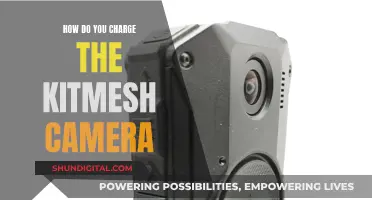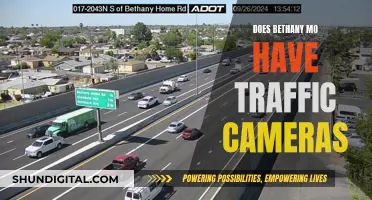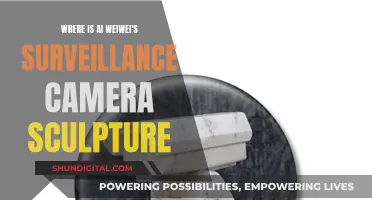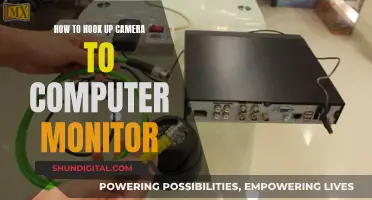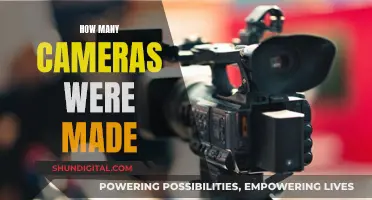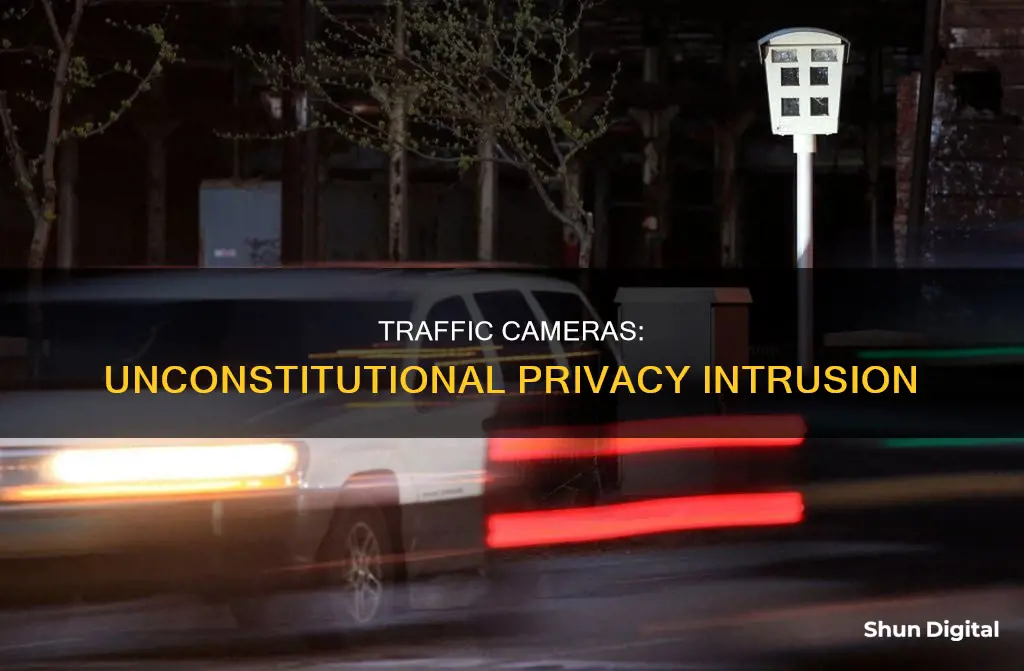
Traffic cameras are a controversial issue, with some arguing that they violate constitutional rights and due process. In the United States, municipalities have increasingly utilized camera enforcement for red light, failure to stop, or speeding violations. While proponents of traffic cameras cite increased safety and reduced accidents as justifications, critics argue that they infringe on civil liberties and are primarily motivated by revenue generation. The use of these cameras has sparked debates about individual rights, government intrusion, and the potential for disproportionate impacts on certain communities. The controversy surrounding traffic cameras has led to legal challenges and community opposition, with concerns raised about their constitutionality and the fairness of their implementation.
| Characteristics | Values |
|---|---|
| Violation of Constitutional Rights | Sixth Amendment, Fourteenth Amendment |
| Intrusion into daily life | Disturbing intrusion |
| Uncertainty of offender identity | Ticket issued to owner of vehicle |
| Difficulty in enforcement and collection | No clear recourse in court |
| Financial incentives | Revenue boon for governments |
| Mixed evidence of effectiveness | Studies show mixed results on safety |
| Unpopularity | Voters have opposed cameras by an average margin of 63% |
What You'll Learn

Violation of the Sixth Amendment
The Sixth Amendment to the US Constitution grants criminal defendants the right to be confronted with the witnesses against them. This is known as the Confrontation Clause.
Traffic cameras, such as red-light cameras, can be seen as a violation of this amendment as it is a camera, not a person, that acts as a witness to the offense. This means that the violation cannot be considered a criminal offense. The ticket is issued to the owner of the vehicle, not the person driving it, leaving uncertainty as to the identity of the offender.
The ticket is therefore a civil fine, making enforcement and collection difficult. Governments have worked around this problem by requiring payment of the fine before motorists can renew their driver's license or auto registration. However, this means that drivers are not given their day in court and are assumed guilty until proven innocent.
The use of red-light camera evidence has been challenged on 6th Amendment grounds, with some arguing that the photographs collected by such devices constitute testimonial evidence and are therefore inadmissible unless the accused can cross-examine the technician or police officer who reviewed the footage.
The American justice system is built on the principle that the accused has the right to face their accuser in court and question them. While those ticketed for red-light violations still possess this right, it takes a slightly different form due to the testimonial nature of the evidence.
However, given the modest fines for such offenses, many people choose not to fight the charge and plead guilty. This raises concerns about the accused being forced to prove their innocence instead of the court having to prove their guilt.
Surveillance Cameras in Movie Theaters: Are We Being Watched?
You may want to see also

Unfair targeting of minority communities
Traffic cameras have been criticised for unfairly targeting minority communities. In Chicago, for example, the tickets and fines generated by automated speed cameras disproportionately affect Black and Brown residents. This is partly due to the fact that these communities often have poorer infrastructure, with more potholes and multilane streets, which encourages speeding. In addition, these areas tend to have less access to public transportation, so residents are more reliant on driving. As a result, they bear the brunt of the fines generated by the cameras.
The American Civil Liberties Union (ACLU) has raised concerns about the use of speed cameras in minority communities, arguing that these areas are already prone to unsafe driving due to wider streets and less supervision. They advocate for alternative solutions such as speed bumps to address the issue of traffic safety.
The issue of unfair targeting is not unique to Chicago. In Ferguson, Missouri, a similar pattern was observed, with the Justice Department concluding that the city's strategy of generating revenue through policing disproportionately harmed African Americans. This has sparked debates about the motivations behind the implementation of traffic cameras, with critics arguing that they are more about financial gain than public safety.
The use of traffic cameras has also been associated with concerns about government surveillance and the potential misuse of data. This is especially pertinent in minority communities, where there may already be a history of targeted enforcement and discrimination. The impact of these cameras can be significant, affecting not just driving habits but also the financial well-being of individuals and communities.
To address these issues, some have proposed alternative solutions such as speed bumps or improved infrastructure. Additionally, there have been calls for a more careful and balanced approach to implementing traffic cameras to avoid exacerbating existing inequalities and targeting minority communities unfairly.
Mastering Vignette Effects in Camera Raw
You may want to see also

Uncertainty of offender identity
The use of traffic cameras has been a topic of debate for years, with critics arguing that they are unconstitutional and an intrusion on daily life. One of the main arguments against traffic cameras is the uncertainty of offender identity.
Traffic cameras, including red-light and speed cameras, capture images or videos of vehicles that have potentially committed a traffic violation. The tickets generated by these cameras are typically sent to the owner of the vehicle, regardless of who was driving at the time of the offence. This raises concerns about the accuracy of offender identification, as the owner of the vehicle may not have been the one behind the wheel when the violation occurred.
In the case of a rental car, borrowed car, or even a car with multiple drivers in the household, it can be challenging to determine who was responsible for the infraction. This lack of certainty can lead to unfair penalties and a violation of the vehicle owner's rights. For example, in the US, the Sixth Amendment's Confrontation Clause grants criminal defendants the right to be confronted by witnesses against them. However, with traffic cameras, there is no personal witness to the offence, and the ticket is issued solely based on the camera evidence.
The uncertainty of offender identity also raises questions about the enforceability and collection of fines. In most cases, these tickets are treated as civil fines, and the offender does not have the same recourse to contest the violation in court as they would with a criminal offence. This can result in a lack of due process and a denial of the principle of "innocent until proven guilty."
To address this issue, some jurisdictions have implemented procedures to identify the actual driver at the time of the offence. This may include requiring the vehicle owner to provide information about who was driving or allowing the owner to dispute the ticket and provide evidence that they were not the driver. However, these processes can be cumbersome and may not always lead to a satisfactory resolution.
The uncertainty of offender identity associated with traffic cameras underscores the importance of balancing public safety and efficient traffic enforcement with the protection of individual rights and due process.
Dispose of Your Camera's Lithium Battery the Right Way
You may want to see also

Intrusion of privacy
Traffic cameras are a contentious issue in the US, with many states and counties adopting their use, while others have banned them. One of the main arguments against their use is that they infringe on citizens' privacy.
The use of traffic cameras has raised questions about the privacy of citizens. In the US, the National Motorists Association (NMA) has opposed red-light cameras, stating that they violate citizens' privacy and do not increase road safety. The NMA also argues that the use of such cameras raises legal issues and violates citizens' Sixth Amendment right to be confronted by witnesses against them. This is because, in most cases, a camera—not a person—is the witness to the offence.
In some places, red-light cameras have been installed with facial recognition technology. In Shenzhen, China, for example, if a motorist or pedestrian runs a red light, they are captured by a 7-megapixel camera. Within 20 minutes, a facial recognition system identifies personal information, including the individual's family name, ID number, and address, which are then displayed on a street advertising screen and published on social media.
In the US, the argument that red-light cameras violate citizens' privacy has been addressed in court. A 2009 ruling by the 7th US Circuit Court of Appeals stated that "no one has a fundamental right to run a red light or avoid being seen by a camera on a public street". Additionally, in most states, the camera does not photograph the driver or the occupants of the vehicle.
However, the use of traffic cameras has been found to be unpopular with the public. Since 1991, there have been 42 elections on adopting or prohibiting speed or red-light cameras, with voters opposing the cameras by an average margin of 63%.
Foiling Traffic Cameras: Tips to Avoid Getting Snapped
You may want to see also

Conflict of interest
Traffic cameras are a contentious issue in the United States, with some arguing that they are unconstitutional and a violation of citizens' rights. One of the primary concerns surrounding traffic cameras is the potential conflict of interest between government officials, camera companies, and public safety.
The use of traffic cameras is often justified by local governments and camera companies as a way to improve road safety and reduce accidents. However, the financial incentives associated with these programs create a conflict of interest. In many cases, camera companies contract with local governments to install and operate the cameras in exchange for a share of the revenue generated from fines. This arrangement provides governments with a new revenue stream without any operating costs and guarantees profits for the camera companies. As a result, there is an incentive to issue as many tickets as possible, regardless of whether it improves road safety.
This conflict of interest can lead to questionable practices, such as decreasing the timing of yellow lights to catch more drivers running red lights. Studies have shown that longer yellow light times and all-way red times can significantly reduce accidents. However, when local governments have a financial stake in issuing tickets, they may be tempted to shorten yellow light times to increase revenue. This practice undermines the very purpose of traffic cameras, which is supposed to be improving road safety.
Furthermore, the issuance of civil fines without providing drivers with a day in court or the right to confront their accuser (in this case, the camera) is a violation of the Sixth Amendment's Confrontation Clause. The lack of legal recourse for drivers receiving these fines contributes to a sense of injustice and mistrust in the government.
The financial incentives associated with traffic cameras can also disproportionately impact certain communities, particularly Black and Brown residents. For example, in Chicago, the majority of tickets and fines from automated speed cameras were issued in majority-Black or Latinx neighborhoods, which already face socioeconomic challenges and limited access to public transportation. As a result, these communities bear the brunt of the financial burden, further exacerbating existing inequalities.
In conclusion, the conflict of interest inherent in the traffic camera programs between government officials, camera companies, and public safety undermines the rule of law and erodes trust in the legal system. The financial incentives can lead to questionable practices, disproportionately impact marginalized communities, and divert attention from more effective solutions for improving road safety.
The Surveillance State: Orange County's Camera Network
You may want to see also
Frequently asked questions
The Confrontation Clause of the Sixth Amendment grants criminal defendants the right to be confronted with the witnesses against them. Since a camera is not a person, a violation cannot be considered a criminal offense. The ticket is issued to the vehicle owner, leaving uncertainty about the offender's identity. Therefore, the ticket is usually a civil fine, making enforcement and collection difficult.
Some people argue that traffic cameras violate citizens' right to due process. For example, in a case in New York, a plaintiff filed a lawsuit against a traffic enforcement agency after receiving a violation ticket generated by a red light camera. The plaintiff claimed a violation of the Due Process and Equal Protection Clauses of the Fourteenth Amendment. However, the suit was dismissed, with the court finding that the right to be free from a red light ticket does not fall under the specific and fundamental rights protected by the US Constitution and substantive due process.
Critics argue that automated speed cameras disproportionately issue tickets and fines to Black and Brown residents, as seen in Chicago. Studies have shown that majority Black or Latinx neighborhoods have less access to public transportation, and residents cannot afford the fines. This has led to a higher rate of personal bankruptcy cases related to fines and fees in Chicago.


